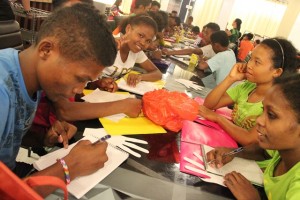
Tacloban City, Leyte – Some 50 youths belonging to indigenous groups of Mamanwas, Badjaos, and Manobos said that they became more aware of their rights and privileges after attending the recently concluded three-day Indigenous Youth Conference organized by the Department of Social Welfare and Development (DSWD).
Jomalyn Bernaldo, 13, a Mamanwa from Caibiran, Biliran, said that the conference opened up new ways of understanding their rights and the significance of embracing their own tradition.
“Damo an akon nabaruan labi na han RA 8371 or Indigenous People’s Rights Act (IPRA) nga akon iistorya pag-uli ko ha amon (There were many things I learned, especially about RA 8371 or IPRA, which I will be sharing once I get back to my hometown).”
IPRA was passed in 1997 which recognizes, promotes, and protects the rights of indigenous cultural communities and indigenous peoples.
DSWD Secretary Corazon Juliano-Soliman said that the department is constantly looking for ways to reach out to IPs.
“The major advocacy of the conference was to empower our ‘katutubos’ to promote their culture and make them feel that they belong. With the conference, they will not feel that they are being isolated and discriminated,” Sec. Soliman added.
During the conference, DSWD also discussed its interventions and programs in upholding human rights especially the Pantawid Pamilyang Pilipino Program.
Pantawid Pamilya provides cash grants to poor households including IPs with children 0-18 years old provided they comply with the conditions of the program such as sending their children to school, bringing them to health centers for check up, and attending the Family Development Sessions.
As of July 31, some 4.1 million families are registered Pantawid Pamilya beneficiaries nationwide. Of this, 394,924 families are IPs.
Hazel Torrefiel, Development Management Officer V of the National Commission of Indigenous People (NCIP) who joined the conference shared how Pantawid Pamilya has shaped positive changes especially among the IP communities.
“The enrollment of IP students has increased. On the health aspect, they are now especially concerned with hygiene and sanitation. Although they have their own unique ways of treating illnesses, they now make it a point to visit health centers,” she noted.
In Region VIII, 102 IP families are beneficiaries of Pantawid Pamilya.
DSWD has an ongoing enrollment of IP households in the region to the Modified Conditional Cash Transfer (MCCT) Program for Indigenous People which was created to match their culture and traditions.
Due to the inaccessibility of their communities, there were IPs who were not assessed during the first assessment period in 2009.
The IP youths serve as the newest advocates of the Kaya Ko ang Pagbabago campaign of DSWD.
They enthusiastically shared their Kaya Ko ang Pagbabago pledges to become partner- advocates of hope and change, and to fight discrimination by finishing their studies, getting decent jobs, and lending a hand to anyone in need. ###


